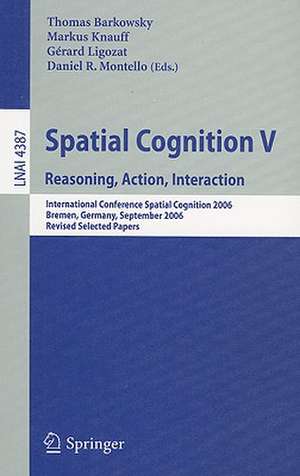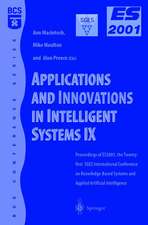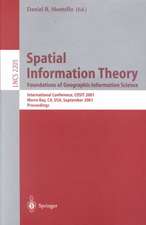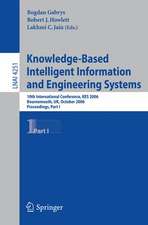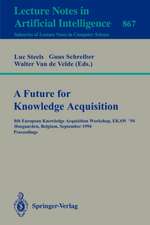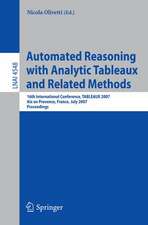Spatial Cognition V: Reasoning, Action, Interaction: Lecture Notes in Computer Science, cartea 4387
Editat de Thomas Barkowsky, Markus Knauff, Gérard Ligozat, Daniel R. Montelloen Limba Engleză Paperback – 22 noi 2007
Din seria Lecture Notes in Computer Science
- 20%
 Preț: 1061.55 lei
Preț: 1061.55 lei - 20%
 Preț: 307.71 lei
Preț: 307.71 lei - 20%
 Preț: 438.69 lei
Preț: 438.69 lei - 20%
 Preț: 645.28 lei
Preț: 645.28 lei -
 Preț: 410.88 lei
Preț: 410.88 lei - 15%
 Preț: 580.46 lei
Preț: 580.46 lei - 17%
 Preț: 427.22 lei
Preț: 427.22 lei - 20%
 Preț: 596.46 lei
Preț: 596.46 lei -
 Preț: 449.57 lei
Preț: 449.57 lei - 20%
 Preț: 353.50 lei
Preț: 353.50 lei - 20%
 Preț: 1414.79 lei
Preț: 1414.79 lei - 20%
 Preț: 309.90 lei
Preț: 309.90 lei - 20%
 Preț: 583.40 lei
Preț: 583.40 lei - 20%
 Preț: 1075.26 lei
Preț: 1075.26 lei - 20%
 Preț: 310.26 lei
Preț: 310.26 lei - 20%
 Preț: 655.02 lei
Preț: 655.02 lei - 20%
 Preț: 580.93 lei
Preț: 580.93 lei - 20%
 Preț: 340.32 lei
Preț: 340.32 lei - 18%
 Preț: 938.83 lei
Preț: 938.83 lei - 20%
 Preț: 591.51 lei
Preț: 591.51 lei - 15%
 Preț: 438.59 lei
Preț: 438.59 lei - 20%
 Preț: 337.00 lei
Preț: 337.00 lei -
 Preț: 389.48 lei
Preț: 389.48 lei - 20%
 Preț: 607.39 lei
Preț: 607.39 lei - 20%
 Preț: 1024.44 lei
Preț: 1024.44 lei - 20%
 Preț: 579.30 lei
Preț: 579.30 lei - 20%
 Preț: 763.23 lei
Preț: 763.23 lei - 20%
 Preț: 453.32 lei
Preț: 453.32 lei - 20%
 Preț: 575.48 lei
Preț: 575.48 lei - 20%
 Preț: 585.88 lei
Preț: 585.88 lei - 20%
 Preț: 825.93 lei
Preț: 825.93 lei - 20%
 Preț: 763.23 lei
Preț: 763.23 lei - 17%
 Preț: 360.19 lei
Preț: 360.19 lei - 20%
 Preț: 1183.14 lei
Preț: 1183.14 lei - 20%
 Preț: 340.32 lei
Preț: 340.32 lei - 20%
 Preț: 504.57 lei
Preț: 504.57 lei - 20%
 Preț: 369.12 lei
Preț: 369.12 lei - 20%
 Preț: 583.40 lei
Preț: 583.40 lei - 20%
 Preț: 343.62 lei
Preț: 343.62 lei - 20%
 Preț: 350.21 lei
Preț: 350.21 lei - 20%
 Preț: 764.89 lei
Preț: 764.89 lei - 20%
 Preț: 583.40 lei
Preț: 583.40 lei - 20%
 Preț: 649.49 lei
Preț: 649.49 lei - 20%
 Preț: 341.95 lei
Preț: 341.95 lei - 20%
 Preț: 238.01 lei
Preț: 238.01 lei - 20%
 Preț: 538.29 lei
Preț: 538.29 lei
Preț: 345.26 lei
Preț vechi: 431.57 lei
-20% Nou
Puncte Express: 518
Preț estimativ în valută:
66.06€ • 69.16$ • 54.66£
66.06€ • 69.16$ • 54.66£
Carte tipărită la comandă
Livrare economică 07-21 aprilie
Preluare comenzi: 021 569.72.76
Specificații
ISBN-13: 9783540756651
ISBN-10: 3540756655
Pagini: 526
Ilustrații: XVII, 501 p.
Dimensiuni: 155 x 235 x 32 mm
Greutate: 0.77 kg
Ediția:2007
Editura: Springer Berlin, Heidelberg
Colecția Springer
Seriile Lecture Notes in Computer Science, Lecture Notes in Artificial Intelligence
Locul publicării:Berlin, Heidelberg, Germany
ISBN-10: 3540756655
Pagini: 526
Ilustrații: XVII, 501 p.
Dimensiuni: 155 x 235 x 32 mm
Greutate: 0.77 kg
Ediția:2007
Editura: Springer Berlin, Heidelberg
Colecția Springer
Seriile Lecture Notes in Computer Science, Lecture Notes in Artificial Intelligence
Locul publicării:Berlin, Heidelberg, Germany
Public țintă
ResearchCuprins
Spatial Reasoning, Human-Robot Interaction, and Assistance.- Reachability and Dependency Calculi: Reasoning in Network Algebras.- The Qualitative Trajectory Calculus on Networks.- Qualitative Spatial Representation and Reasoning in the SparQ-Toolbox.- Remembering Places in Space: A Human Analog Study of the Morris Water Maze.- The Role of Users’ Concepts of the Robot in Human-Robot Spatial Instruction.- Collaborative Assistance with Spatio-temporal Planning Problems.- Visuo-Spatial Reasoning and Spatial Dynamics.- Dialog-Based 3D-Image Recognition Using a Domain Ontology.- Protein Structure Prediction with Visuospatial Analogy.- The Spatial Representation of Dynamic Scenes – An Integrative Approach.- Modeling Geospatial Events and Impacts Through Qualitative Change.- Spatial Concepts, Human Memory, and Mental Reasoning.- Preferred Mental Models: How and Why They Are So Important in Human Reasoning with Spatial Relations.- The Spatial and the Visual in Mental Spatial Reasoning: An Ill-Posed Distinction.- Grounded Perceptual Schemas: Developmental Acquisition of Spatial Concepts.- Modeling Human Spatial Memory Within a Symbolic Architecture of Cognition.- Updating in Models of Spatial Memory.- Sensorimotor Interference When Reasoning About Described Environments.- Mechanisms for Human Spatial Competence.- Navigation, Wayfinding, and Route Instructions.- Algorithms for Reliable Navigation and Wayfinding.- Interpreting Route Instructions as Qualitative Spatial Actions.- Knowledge Based Schematization of Route Directions.- Map Use and Wayfinding Strategies in a Multi-building Ensemble.- How Much Information Do You Need? Schematic Maps in Wayfinding and Self Localisation.- Wayfinding Strategies in Behavior and Language: A Symmetric and Interdisciplinary Approach toCognitive Processes.- A Spatial Cognitive Map and a Human-Like Memory Model Dedicated to Pedestrian Navigation in Virtual Urban Environments.- Linguistic and Social Issues in Spatial Knowledge Processing.- The Influence of Scale, Context and Spatial Preposition in Linguistic Topology.- Before or After: Prepositions in Spatially Constrained Systems.- Discourse Factors Influencing Spatial Descriptions in English and German.- Autobahn People: Distance Estimations Between German Cities Biased by Social Factors and the Autobahn.
